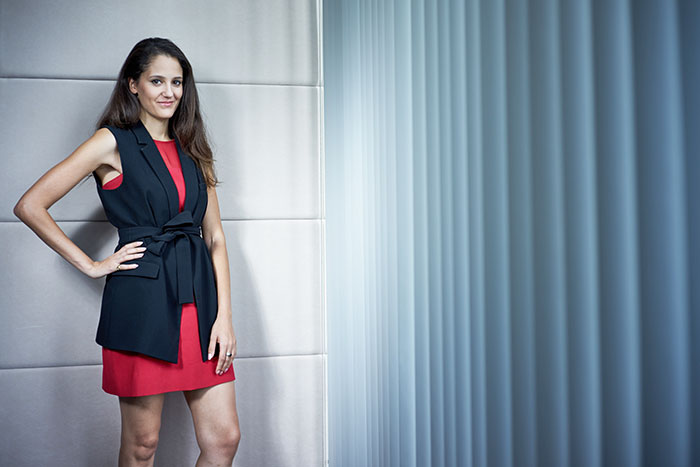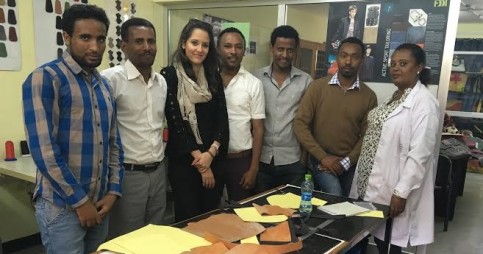This CUHK MBA’s Social Enterprise Funds Women’s Education And Scholarships In Ethiopia

Media Coverage by BusinessBecause:
Antoinette Bailey is a serial entrepreneur with a social conscience.
She’s co-founded Maison Ethiopie, a social enterprise which sources high quality leather from manufacturers in Ethiopia, sells leather goods internationally, and reinvests into the country. The aim: to fund the development of women’s education in Ethiopia.
The half British, half Ethiopian entrepreneur is part of a millennial generation of MBA students looking to make a difference in their careers. And alongside an MBA at Hong Kong’s CUHK Business School, she’s been travelling the world – to the US, Europe and the Middle East – to promote the Maison Ethiopie brand.
Yet her social ventures don’t stop there. She’s set up a fashion fund to support Ethiopia-based manufacturers and designers, and a UK-based film fund looking to invest in an emerging Ethiopian film market. The film fund’s first live-action film – Street Fighter: Assassin’s Fist – was featured at the Cannes Film Festival.
Antoinette previously managed the private family office of an ultra high-net-worth individual, whose product portfolio includes a premier league soccer club, a well-known retail outlet and hotel in the UK.
Now, her former boss is her business partner. And together, they’re driving development in Ethiopia, changing perceptions and looking to put the burgeoning emerging economy on the map.
Why did you decide to start up your own social enterprise?
I want to do something good for the country that I’m from and that’s part of my heritage.
Ethiopia is a great place to be investing in; it’s an emerging economy, and unlike some of the countries around it, it’s politically stable, tolerant and cosmopolitan.
While other countries have quite highly saturated markets, in Ethiopia you have the opportunity. If you have the talent, the skill-set, the patience and the desire, you can make something really amazing happen.
What is the future plan for Maison Ethiopie?
The idea is to use locally-sourced leather from Ethiopia to manufacture products and sell internationally with a percentage going back and re-investing into local development. We want to have a charitable impact; to use part of our profits to re-invest in education and get scholarship programs set up for women.
We’re currently selling on a small scale in London and in the UAE. We want to expand that, to start mass producing and selling in major retail outlets, and to build an international presence.
What advice do you have for MBAs looking to start their own business?
Your business plan is your blueprint. But ultimately, you’re going into the real world.
You’ll have days where it’s amazing and everything falls into place. And then you’ll have days where things aren’t going the way you want.
You have to be cope with uncertainty and ups and downs. If you can’t, then I don’t think entrepreneurship is the route for you.

What is the future for women in business?
People on all levels are gunning for female equality, society is changing, and in emerging economies it’s no longer so taboo for women to break gender stereotypes.
We’ll reach a stage where there’s less gender disparity in high level positions. And you’ll probably see the rise of more and more female entrepreneurs.
With entrepreneurship, you choose your hours. Granted, sometimes you need 32 hours in a day! But you have that flexibility. You no longer have to choose between being a CEO and having kids; you can merge the two. I think a lot of women are seeing the appeal in that.
Why did you decide to pursue an MBA at CUHK?
I wanted to continue on the entrepreneurial route and bridge any theoretical gaps that I had.
I was very well-travelled in the US and Europe, but I knew nothing about Asia. I wanted to find out why Asia has such a prominent presence in the global marketplace. And CUHK – with its entrepreneurship specialization – seemed like the perfect place to do it.
How have you profited from your MBA experience?
I know you have all the prestige of schools like Harvard and Stanford where you can learn and take electives about doing business in Asia. But I really don’t think you can appreciate how that translates on a day-to-day basis without actually having been immersed in the culture.
At CUHK you work with people who approach things from different perspectives. I’ve become a much more tolerant and patient person, and I know how to deal with situations of uncertainty and to be sympathetic to different ways of approaching situations.
Media: BusinessBecause
Section: News/ MBA Hong Kong
Date published: Jun 15, 2016

